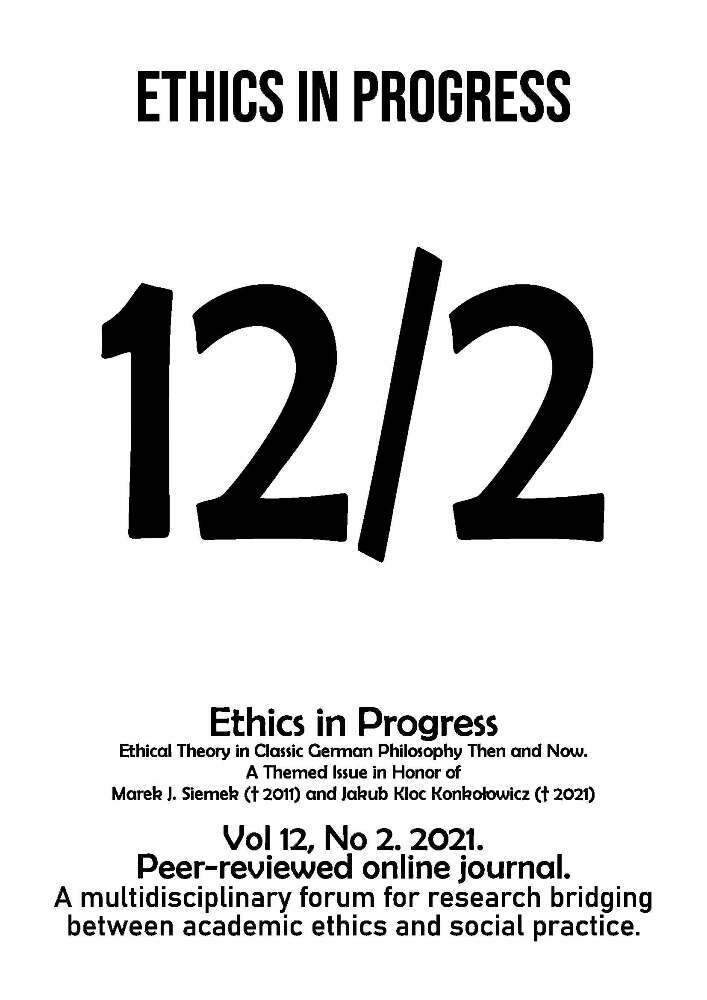Abstract
The article interprets the methodological potential of Hegel’s speculative dialectics as a possible course of spiritual evolution of the Absolute subject. The intention is towards the method, first through the very construction of the “idea of freedom” from the point of view of Logic; second, through the constitutive function of freedom and the transition of the subjective spirit into the objective spirit; third, through the unfolding of mediation in the realms of the objective spirit. This essentially substantial methodologization dissolves the theoretical space of the idea of the mediating function of freedom as an ontological principle of ethical life. In line with the paradigm of such a course, the text considers a project of speculative ethics, a project within the framework of which the methodological and ontological sublation of spiritual evolution takes place.
References
Aristotle 1999. Politics, trans. B. Jowett. Kitchener: Batoche Books.
Brooks T. 2017. “Hegel’s Philosophy of Law,” in D. Moyar (Ed.), The Oxford Handbook of Hegel. New York: Oxford University Press.
Del Vecchio G. 1921. The Formal Basis of Law, trans. J. Lisle. New York: The Macmillan Company.
Duplancic V. 2006. „Erfahrung der Freiheit: die Entwicklung der Freiheitsidee in der Phänomenologie des Geistes von G.W.F. Hegel.“ Doctoral Dissertation, Ruhr Universität Bochum. URL: https://www.academia.edu/1884156/Erfahrung_der_Freiheit_die_Entwicklung_der_Freiheitsidee_in_der_Ph%C3%A4nomenologie_des_Geistes_von_GWF_Hegel (retrieved on August 16, 2021).
Häfelin U. 1959. Rechtspersönlichkeit des Staates: Dogmengeschichtliche Darstellung. Tübingen: J. C. B. Mohr (Paul Siebeck).
Hegel G. W. F. 2010a. Encyclopedia of the Philosophical Sciences in Basic Outline. Part I: Science of Logic, trans. K. Brinkmann & D. O. Dahlstrom. New York: Cambridge University Press.
Hegel G. W. F. 1977. Phenomenology of Spirit, trans. A. V. Miller. Oxford University Press.
Hegel G. W. F. 2005. Philosophy of Right, trans. S. W. Dyde. New York: Dover Publications, INC. Mineola.
Hegel G. W. F. 2010b. The Science of Logic, trans. G. Di Giovanni. New York: Cambridge University Press.
Jaeschke W. 2003. Hegel-Handbuch: Leben – Werk – Schule. Stuttgart – Weimar: Verlag J. B. Metzler.
Kelsen H. 2005. Pure Theory of Law, trans. M. Knight. New Jersey: The Lawbook Exchange, Ltd. Clark.
Lasson A. 1967. System der Rechtsphilosophie. Berlin: Walter de Gruyter Verlag.
Lütterfelds W. 2007. „Hegel’s Identitätsthese von der Substanz als Subjekt und die dialektische Selbstauflösung begrifflicher Bestimmungen,“ Synthesis Philosophica 22(1):59–85.
Pippin R. B. 2000. “Hegel’s Practical Philosophy: The Realization of Freedom,” in K. Ameriks (Ed.), The Cambridge Companion to German Idealism (pp. 180–199). New York: Cambridge University Press.
Rosenkranz K. 1844. G. W. F. Hegel’s Leben. Berlin: Verlag von Duncker und Humblot.
Sabine G. H. 1933. “Rudolf Stammler’s Critical Philosophy of Law,” Cornell Law Review 18(3):321–350.
Stammler R. 1925. The Theory of Justice, trans. I. Husik. New York: The Macmillan Company.
Wood A. W. 1990. Hegel’s Ethical Thought. Cambridge: Cambridge University Press.
Wood A. W. 1993. “Hegel’s Ethics,” in F. C. Beiser (Ed.), The Cambridge Companion to Hegel (pp. 211–233). Cambridge: Cambridge University Press.





